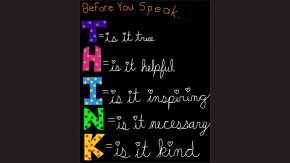A Message from the Head of Lindfield Campus
Mistakes are Part of Learning
“I never failed. I just found 1,000 ways that didn’t work.” Thomas Edison
Recently I found an article summarised in the Marshall memo by assessment guru Thomas Guskey (University of Kentucky) about the difference between mistakes, which are a necessary part of the learning process and failure. This article deals with an important aspect of educating our boys in terms of the way they approach challenging situations and contexts. Guskey draws a distinction between failing and making mistakes. “Failure implies a complete breakdown, disaster, and disappointment,” he says. “There is an important qualitative difference between ‘I made a mistake’ and ‘I failed.’
Thomas Edison said this when reflecting on the process to invent the first light bulb: “I never failed. I just found 1,000 ways that didn’t work.” And the same attitude should apply to our boys as they work their way to mastery. “Acquiring new knowledge or skills always involves errors, mistakes, and occasional setbacks, especially when learning challenging material or complex tasks,” says Guskey. “But to see these setbacks as failures invokes unnecessary negativity and pessimism.”
Mistakes for our boys are part of the learning process in every area, whether it is reading, cricket, skateboarding or any area we want to improve.
Marshal wrote that fixing mistakes is relatively easy, but recovering from failure is complicated. One critical factor is attribution – whether people blame external factors (a bad referee, an unfair assessment) or take personal responsibility. Another factor is people’s mindset: fixed (I’m just not good at math) versus growth (I can improve by working hard). All this has three implications for parents and teachers:
- Anticipate learning challenges and address them directly as students, parents and teachers.
- Constantly check for understanding to identify problems as early as possible and then look to solve problems in different ways.
- Help boys understand “that the conditions for success are within their control and that we will help them remedy their learning errors when they occur,” says Guskey.
In other words, we must help our boys have a growth stance to learning, and as parents and teachers we must develop the same stance. We must help our boys realise that we can make mistakes and that is okay because mistakes give feedback on what we need to do to improve.
We want our Newington boys to be resilient and resourceful so parents and teachers must model this understanding that mistakes are part of the learning process and making mistakes does not equate to failing. It is an opportunity to get new information which we can use to improve the way we look at a problem.
“Why Glorify Failure to Enhance Success?” by Thomas Guskey in Education Update, June 2015 (Vol. 57, #6, p. 2-3)
‘The Difference Between Making Mistakes and Failing’ by Kim Marshall, in Marshall Memo, June, 2015 (Issue 592 #2 )
Ben Barrington-Higgs






